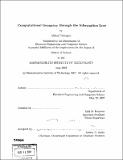Computational geometry through the information lens
Author(s)
Pătrașcu, Mihai
DownloadFull printable version (6.588Mb)
Other Contributors
Massachusetts Institute of Technology. Dept. of Electrical Engineering and Computer Science.
Advisor
Erik D. Demaine.
Terms of use
Metadata
Show full item recordAbstract
This thesis revisits classic problems in computational geometry from the modern algorithmic perspective of exploiting the bounded precision of the input. In one dimension, this viewpoint has taken over as the standard model of computation, and has led to a powerful suite of techniques that constitute a mature field of research. In two or more dimensions, we have seen great success in understanding orthogonal problems, which decompose naturally into one dimensional problems. However, problems of a nonorthogonal nature, the core of computational geometry, have remained uncracked for many years despite extensive effort. For example, Willard asked in SODA'92 for a o(nlg n) algorithm for Voronoi diagrams. Despite growing interest in the problem, it was not successfully solved until this thesis. Formally, let w be the number of bits in a computer word, and consider n points with O(w)-bit rational coordinates. This thesis describes: * a data structure for 2-d point location with O(n) space, and 0( ... )query time. * randomized algorithms with running time 9 ... ) for 3-d convex hull, 2-d Voronoi diagram, 2-d line segment intersection, and a variety of related problems. * a data structure for 2-d dynamic convex hull, with O ( ... )query time, and O ( ... ) update time. More generally, this thesis develops a suite of techniques for exploiting bounded precision in geometric problems, hopefully laying the foundations for a rejuvenated research direction.
Description
Thesis (S.M.)--Massachusetts Institute of Technology, Dept. of Electrical Engineering and Computer Science, 2007. Includes bibliographical references (p. 111-117).
Date issued
2007Department
Massachusetts Institute of Technology. Department of Electrical Engineering and Computer SciencePublisher
Massachusetts Institute of Technology
Keywords
Electrical Engineering and Computer Science.